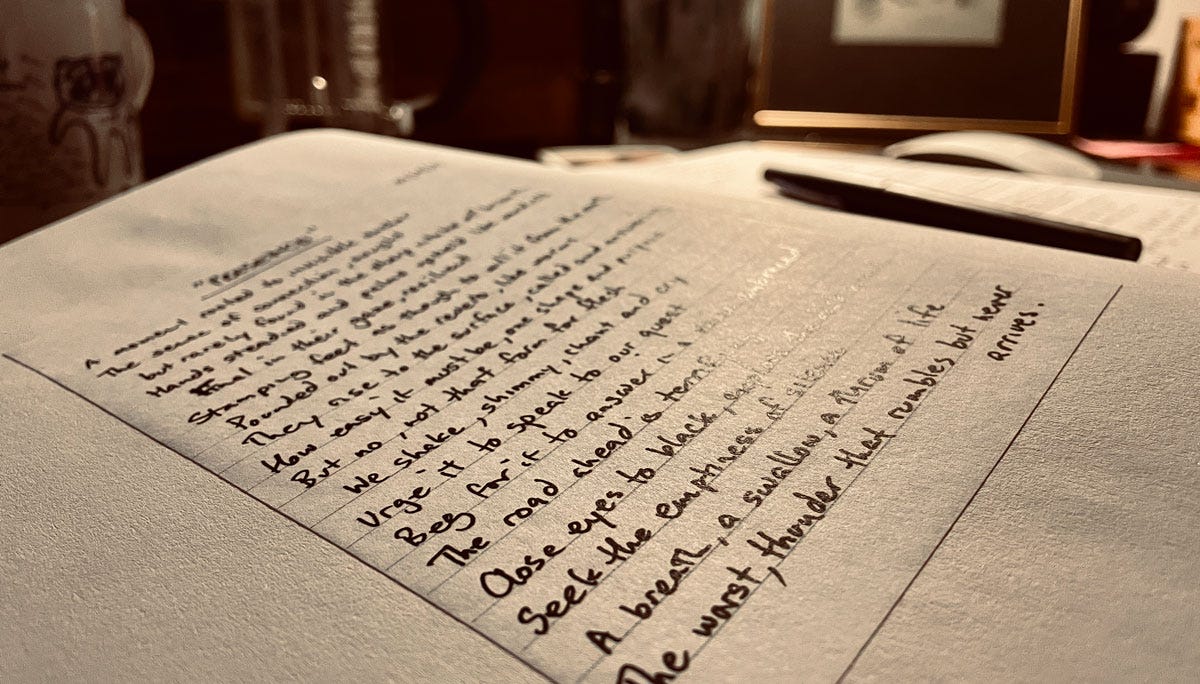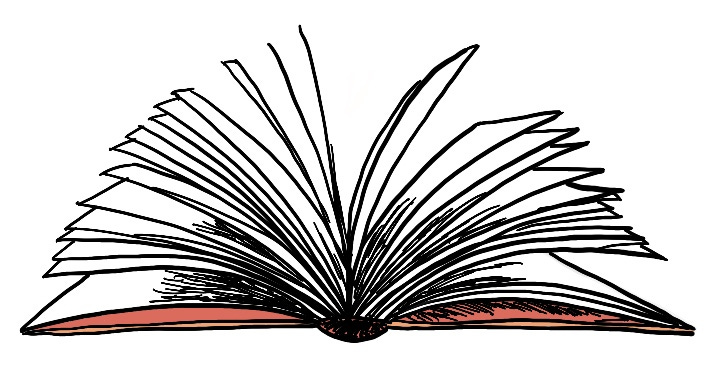It all comes out in the rinse (of the draft)
Take that first draft and scrub. It’s where you’ll find the shine.
Write the words. Let them flow out and from you. Blood from your brain, sweat from your heart, life from your death. Let the words gallop fast and angry and sweet and shy, with agitated vigor and relentless splurge. Unmuzzle the muted. Flood light to the dark halls of your consciousness and guide them to the finish lines of our world. These are your words. This is your poem. Construct, compile, now rinse.
I stare at the text. Part of my brain says it is done, but that’s the lazy part. There are other parts speaking now. Whole suburbs on the outskirts of Brain City have sent representatives to my Capitol. They are protesting on the steps and chaining themselves to the railings as they yell their demands. With raised fists they advocate for the rinse, the multi rinse, the glisten rinse, the clarifying, all-commanding, edifying shine that can only come from polished work drying on a rack in the kitchen of creativity.
Which is a mouthful.
A long-winded way of me saying: How do you work a poem? Or a draft of anything for that matter? This is me. Talking. Real-time. Pretending I know.
Welcome to The Rinse.
Write the words. Blood. Sweat. Life. Merge your soul with the air and crystalize the seam. Stream the feed from the dark halls of your consciousness to straddle the throne to this world. These are the words. This is your poem. Open the door and beckon to the signal.
It will all come out in The Rinse. The irritating detritus, the throwaway scraps, the bloated fat, and slimy grime. Skimmed from the surface and down the drain it will go, off to clog up someone else’s sewer. It must be done—it must be. The sleeves rolled up and detergent at the ready. Without The Rinse, your work will stay a clouded glass, a coffee-stained cup, a saucy plate without shine or clarity.
The Rinse is the filling of your creative sink with the suds of process. The Rinse is the thrashing cleanse. The Rinse is steps 2, 3, 4, and however many rinses you need to reveal the truth of the thing. Your thing. This work of art. The Rinse will let you know if it’s art or garbage. The Rinse will baptize you in the cool waters of Failure River.
There is a frustration to drafts—ask any copywriter who is now labeling their file “v16” and saving it to the server. This frustration does not come from The Rinse, which for copywriters is all discovery and angles and degrees of compromise while maintaining the joy. No, the frustration is knowing that even as you are typing v16, the shadow of the Draft Boomerang looms. (You will update, it will be declared “Perfect!” and no one will notice it’s identical to v1.)
Copywriters—I see you. I just wanted to acknowledge your pain.
But we should also acknowledge this: the shine is in The Rinse. You scrub away at the truth held at the core of the work, rinse after rinse, and if it ends up being what it was at the start well so be it.
Again. The shine is in The Rinse.
Write the words. Merge your soul with the air and rise. Invite possibility to this infinite poetry. Just write until it’s just right.
The Rinse is harder with your own work. There, I said it. There are some things you don’t want to see disappear down the drain and so you don’t scrub as hard as you should. With your work, you are the client, there is no brief, and no one is making you do the work so who gives a shit if it stays grubby and dull, right? All I can say is resist the urge to leave first drafts as best drafts, even if it turns out to be true. All I can say is throw that first draft in the sink, break out your harshest scrubbing pad, and scuff at your work. Don’t be afraid to use a little elbow grease.
Again, again, again—the shine is in The Rinse.
Write.
This week, I stumbled upon a dissection—a Rinse of a Rinse, if you will—of Elizabeth Bishop’s drafts for the poem “One Art” and it reminded me of what it is to WORK AT a thing. If The Rinse of that Elizabeth Bishop poem shows us anything, it’s that the end result can often look nothing like the start while still being the same thing. You see the seeds of it, right there in draft one, but the working of the poem transforms it into something else entirely. The Rinse occurs over pages of rewrites and notations, and then the format she goes with, in the end, really pulls the strings of the garment together.
It rinsed me a little. And by that, I mean seeing inside that process inspired me to tackle some of my own stacked dishes. My half-finished Speed Poetry project from 2019 sits like mucked-up crockery at the edge of my sink, begging for The Rinse. Of the 365 poems I wrote that year1, I identified about 20 that could do with a good dunking to see what they look like without the smudge of first draft ego on their faces.
But I never got further than that—I never filled my sink2.
It’s not too late. I will drown them in The Rinse. I will hold them underwater in the suds and release them to the surface only when I can be sure they have accepted their baptism. In this, their first moment of cleansing, they will show me their true form—or a glimpse of it at least—and we shall move to the drying rack in preparation for Round 2. Round 3. Whatever it takes.
Maybe there’s even a song in one of them?
Write the words. Let them flow out and from you. Blood from your brain, sweat from your heart, life from your death. Let the words gallop fast and angry and sweet and shy, with agitated vigor and relentless splurge. Unmuzzle the muted. Flood light to the dark halls of your consciousness and guide them to the finish lines of our world. These are your words. This is your poem. Construct, compile, now rinse.
What’s in your sink? Where are your dishes? What will come out in The Rinse? Today, we don our rubber gloves, grab our work by the scruff of its neck, and dunk it in the warm wash of process.
Gurgle gurgle, glug glug.
Yours in tiny thought,
Janeen
This week’s amends…
This is the poem that inspired today’s post, which was broken down (rinsed) by Elizabeth Bishop in the drafts, and then broken down again (rinsed in a different way) by the excellent NYT Close Read series3.
One Art
by Elizabeth BishopThe art of losing isn’t hard to master;
so many things seem filled with the intent
to be lost that their loss is no disaster.Lose something every day. Accept the fluster
of lost door keys, the hour badly spent.
The art of losing isn’t hard to master.Then practice losing farther, losing faster:
places, and names, and where it was you meant
to travel. None of these will bring disaster.I lost my mother’s watch. And look! my last, or
next-to-last, of three loved houses went.
The art of losing isn’t hard to master.I lost two cities, lovely ones. And, vaster,
some realms I owned, two rivers, a continent.
I miss them, but it wasn’t a disaster.—Even losing you (the joking voice, a gesture
I love) I shan’t have lied. It’s evident
the art of losing’s not too hard to master
though it may look like (Write it!) like disaster.
On Rotation: “Cola Bottle Baby” by Edwin Birdsong. Always love hearing Daft Punk source material.
Made for the Canadian 10k movie in a minute competition 2022. It tracks.
Titanic with a cat. That’s it. That’s the caption.
Via Kottke
Did any of this spark a tiny thought of your own?
All in under ten minutes, just to get words and ideas going on something.
I just realized this is my second sink-related Stream in a month. Probably just my subconscious telling me I should let the landlord know my dishwasher is on the fritz.
The W.H. Auden one is also excellent. It doesn’t examine the drafts of the poem, but the context and imagery of Musee des Beaux Arts. It’s fascinating.







Love this! It has inspired me. The shine is in the rinse!😍😍😍
Love this post. "...the end result can often look nothing like the start while still being the same thing." I've been thinking of this a lot lately — and actually happened to tweet about it yesterday. I love the whole idea of the "rinse" — brilliant.